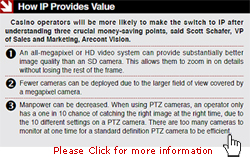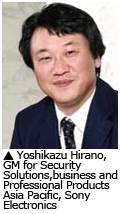Many casino operators have yet to understand the full benefits of implementing an IP system, and some are weary of the new technology for legitimate reasons. Reliability will always be a concern, as is the overall cost of overhauling a system in a tough economy.
Many casino operators have yet to understand the full benefits of implementing an IP system, and some are weary of the new technology for legitimate reasons. Reliability will always be a concern, as is the overall cost of overhauling a system in a tough economy.
As with many other industries, the casino security market suffered the repercussions of the 2008 economic crisis. “In the past three years, there has been little growth. Not a lot of new construction has happened in Las Vegas, and many casinos in Macau have stopped buildling projects,” said Scott Schafer, Executive VP of Sales and Marketing, Arecont Vision.
Now, the gaming market is getting back on its feet, but not at the rate that it has previously. “Many casinos had to stop mid-construction, or continued only to a point without opening,” said Kevin Bozarth, Global Sales EngineeringManager for Pelco (a Schneider Electric company). "In many of these cases, the security systems were already specified but became outdated after two to three years. Thus, the entire consulting, bidding, evaluating and design process for the entire system has to be redone."
Growth will depend on two aspects of the gaming market. “Part of the growth will lie in emerging gaming markets, such as Southeast Asia, and the other half will be in upgrades to existing markets, who were early adopters of digital recording technology,” said Gary James, Director of Business Development, Visimetrics.
The Allure of IP
 HD technology adds to the allure of implementing an IP system. “HD cameras and systems are able to capture quality surveillance footage with good color representation and sharp details. Sharpness of the color footage is an essential factor in casino monitoring, as it should be able to capture the color of the chips in order to allow security personnel identify the specific value,” said Yoshikazu Hirano, GM for Security Solutions, Business and Professional Products Asia Pacific, Sony Electronics.
HD technology adds to the allure of implementing an IP system. “HD cameras and systems are able to capture quality surveillance footage with good color representation and sharp details. Sharpness of the color footage is an essential factor in casino monitoring, as it should be able to capture the color of the chips in order to allow security personnel identify the specific value,” said Yoshikazu Hirano, GM for Security Solutions, Business and Professional Products Asia Pacific, Sony Electronics.
An IP system can go past surveillance and security to help with customer service. “A player rewards system, where players can be tracked and be given points to use anywhere in the world in an affiliated casino, is a great way to market a casino above others,” said Tommy Burns, CEO of Burns and Associates.
 Added analytics is another aspect valued by casino operators. “Casinos represent some of the most difficult environments to monitor and require robust video management software to successfully overcome those obstacles,” said Marc Holtenhoff, CEO of Aimetis. “There are many solutions developed for these casinospecific requirements.”
Added analytics is another aspect valued by casino operators. “Casinos represent some of the most difficult environments to monitor and require robust video management software to successfully overcome those obstacles,” said Marc Holtenhoff, CEO of Aimetis. “There are many solutions developed for these casinospecific requirements.”
The level of IP adoption depends on the client's individual circumstances. “For owners of casinos and other multiple properties, networkbased technology offers many advantages including centralized control,” said Jason Oakley, CEO of North American Video. “It is additionally a cost-effective, long-term strategy for utilizing technology to drive productivity and cost savings. Once network infrastructure is established for core security functions like video surveillance and access control, other solutions incorporating systems such as PoS, elevators/escalators and environmental systems can be added.”
 Most casino security managers are progressive people, who realize new technologies can make their operations more efficient, said Patrick Lim, Director of Sales and Marketing, Ademco Far East. However, there are a few issues that are hindering a swift shift into IP.
Most casino security managers are progressive people, who realize new technologies can make their operations more efficient, said Patrick Lim, Director of Sales and Marketing, Ademco Far East. However, there are a few issues that are hindering a swift shift into IP.
Barriers to IP
One of the biggest barriers to an IP system is the transmission. “Much thought need to be placed in choosing between a single network and multiple networks. The cost savings and convenience of a single network are obvious advantages; however, there is also the fear of overreliance on a single network,” Lim said. “This concern can be addressed by implementing an independent redundant IP network. This will require solutions that are able to support redundant networking in case of network failure, and the cost savings compared to traditional system wiring are significant if multiple systems are riding on these redundant networks.”
 Reliability is a concern for casinos, as lost video equates instant fines upwards of US$100,000. There cannot be a single point of failure,
Reliability is a concern for casinos, as lost video equates instant fines upwards of US$100,000. There cannot be a single point of failure,
including the network switch, the digitizing/encoding technology and storage, said Ian Crosby, CCTV Product Marketing Manager, Bosch Security Systems.
As with all technology, people are wary until solutions have been tried and tested. “People do not wish to move out of their comfort zone and modify what has worked fine before,” Schafer said. This is why it is crucial for solution providers to educate and demonstrate any new technology and systems.
 Certain companies allow their customers to check a system thoroughly prior to commissioning, said Konrad Hechtbauer, Director of Project and Application Development, Dallmeier electronic. "We have facilities to conduct the factory acceptance test, where customers can check the complete system, inc luding network infrastructure." Customers can gain optimal investment and cost transparency, which help dissipate some of the qualms about new technology. Customer support is another emphasis, with many companies offering seminars on operating the new system. “Customers should be supported from the start of the project planning, up to the technical implementation and beyond the project closure,” Hechtbauer said.
Certain companies allow their customers to check a system thoroughly prior to commissioning, said Konrad Hechtbauer, Director of Project and Application Development, Dallmeier electronic. "We have facilities to conduct the factory acceptance test, where customers can check the complete system, inc luding network infrastructure." Customers can gain optimal investment and cost transparency, which help dissipate some of the qualms about new technology. Customer support is another emphasis, with many companies offering seminars on operating the new system. “Customers should be supported from the start of the project planning, up to the technical implementation and beyond the project closure,” Hechtbauer said.
 After seeing that IP solutions do work, casino operators need to consider the business aspect of deploying IP. “Decision makers have already formed strong relationships with analog camera manufacturers, so they will need to see how much better the ROI is from employing megapixel and HD cameras before they will make the decision to switch,” said Paul Bodell, VP of Global Business Development, IQinVision.
After seeing that IP solutions do work, casino operators need to consider the business aspect of deploying IP. “Decision makers have already formed strong relationships with analog camera manufacturers, so they will need to see how much better the ROI is from employing megapixel and HD cameras before they will make the decision to switch,” said Paul Bodell, VP of Global Business Development, IQinVision.
Money will be one of the biggest issues when considering the upgrade to an IP system, as less than 1 percent of the budget is spent on surveillance, according to Bill Miller, CEO of Reliable Security.
In this economy, the best option may be to phase slowly from an analog system to a hybrid system, and finally to IP. “Providers need to provide a simple, scalable way to make the migration to IP,” Holtenhoff said.
In order to do this, the new system architecture needs to align itself with the existing system  design, said Sri Kurniawan, CTO of RCG Holdings. Users will not change their entire systems simply to implement HD capability. Instead, it needs to be integrated with existing systems, James added.
design, said Sri Kurniawan, CTO of RCG Holdings. Users will not change their entire systems simply to implement HD capability. Instead, it needs to be integrated with existing systems, James added.
Casino operators need to be reminded that installing a new IP system may represent savings in the future. “The use of megapixel cameras within a casino allows multiple cameras to be replaced by a single high-megapixel camera,” Bozarth said. Compared to a few years ago, the prices for megapixel and HD cameras have fallen close to analog rates. Prices will hopefully continue to drop, so network cameras become more affordable.
Currently, there are still some concerns about latency and dropped frames. However, once these issues are solved, IP video security will dominate the market, Hirano said.
| Satisfying Regulations |
|
Casinos generate thousands of patrons, and large amounts of cash transactions take place every minute. Aside from the guests themselves, casinos also have to keep a watchful eye on their own employees and satisfy gaming commission regulations. “Surveillance requirements in gaming are driven not just by business and operational requirements, but also gaming regulations that set stringent specifications for the monitoring of gambling businesses and the performance of the surveillance function,” said Jason Oakley, CEO of North American Video.
 These regulations can some times hinder or boost the casino market . “We have seen casino managers being tied down by gaming regulations that were introduced before digitalsys tems we r e developed for casinos, so the equipment cannot currently be used in full,” said Oliver Vellacott, CEO of IndigoVision. “For example, many gaming commissions regulate that casinos have to operate surveillance on a closed network, when there are clear benefits in being able to access the system remotely. Modern network security functionality is now advanced enough to protect against unauthorized access, yet still closed networks are mandated.” These regulations can some times hinder or boost the casino market . “We have seen casino managers being tied down by gaming regulations that were introduced before digitalsys tems we r e developed for casinos, so the equipment cannot currently be used in full,” said Oliver Vellacott, CEO of IndigoVision. “For example, many gaming commissions regulate that casinos have to operate surveillance on a closed network, when there are clear benefits in being able to access the system remotely. Modern network security functionality is now advanced enough to protect against unauthorized access, yet still closed networks are mandated.”
Conversly, the gaming commission in Missouri recently mandated that all casinos in the state move to digital recording, spurring local casinos to upgrade equipment so they could comply with the new rules. These changes in regulations frequently prompt growth spurts among casinos in individual states, said Ian Crosby, CCTV Product Marketing Manager, Bosch Security Systems.
|